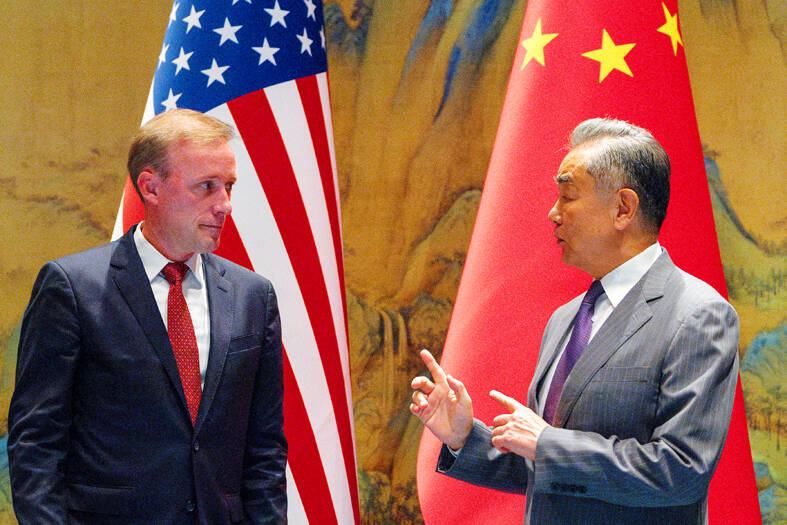Chinese Minister of Foreign Affairs Wang Yi (王毅) and US National Security Adviser Jake Sullivan discussed setting up new talks between their presidents in meetings aimed at managing the two nations’ difficult relationship.
“The two sides discussed a new round of interaction between the two heads of state in the near future,” the Chinese Ministry of Foreign Affairs said in a readout published yesterday evening, without saying how the communication would be conducted.
Wang repeated China’s positions on a range of contentious issues from its territorial claim over Taiwan to its objection to US curbs on its technology ambitions. The Chinese diplomat also expressed a desire to stabilize ties between the world’s two largest economies that frayed during the administration of US President Joe Biden.

Photo: Reuters
He urged the US to stop arming Taiwan and reasserted Beijing’s claims in the South China Sea, calling on Washington not to “condone violations” by the Philippines.
The remarks came after US Indo-Pacific Commander Admiral Samuel Paparo said the country was willing to accompany Philippine vessels during resupply missions in the disputed body of water amid recurring confrontations with Chinese ships.
Despite their differences, the two sides agreed to maintain high-level exchanges and cooperation in areas such as anti-narcotic enforcement, climate change and artificial intelligence, according to the readout.
Sullivan is the first US national security adviser to visit China since 2016. His trip comes months before the US presidential vote in November that pits US Vice President Kamala Harris against former US president Donald Trump. While both candidates are set to maintain a tough stance on the world’s No. 2 economy, the Republican has threatened a blanket 60 percent tariff on Chinese exports.
Biden and Chinese President Xi Jinping (習近平) last met at a summit in San Francisco in November last year, where they held talks that helped stabilize ties and rebuild a series of communication channels.
However, while Biden has repeatedly touted spending “more time” with Xi than any other world leader at “about 90 hours,” he is set to be the first US president since Jimmy Carter not to travel to China while in office, if he does not make it to the Asian nation before January.
Strict controls prevented travel to China during the COVID-19 pandemic, and saw Xi remain within his nation’s borders for years, severely curtailing his international travel agenda and removing the opportunity for face-to-face diplomatic exchanges.
Relations between the two superpowers plunged during that period, after then-US House of Representatives speaker Nancy Pelosi visited Taiwan in August 2022, causing Beijing to suspend military talks.
Other issues have hampered ties. Beijing has complained about US efforts to cut off China from advanced technology, including semiconductors, and the White House’s moves to work with allies on security and economic issues. Canada announced it would impose tariffs on Chinese-made electric vehicles, aluminum and steel hours before Sullivan arrived in Beijing.
Despite those frictions, Sullivan and Wang have met face-to-face every few months over the past few years as part of Biden’s push to keep open lines of communication, in a mechanism known as the “strategic channel.”

SECURITY: As China is ‘reshaping’ Hong Kong’s population, Taiwan must raise the eligibility threshold for applications from Hong Kongers, Chiu Chui-cheng said When Hong Kong and Macau citizens apply for residency in Taiwan, it would be under a new category that includes a “national security observation period,” Mainland Affairs Council (MAC) Minister Chiu Chui-cheng (邱垂正) said yesterday. President William Lai (賴清德) on March 13 announced 17 strategies to counter China’s aggression toward Taiwan, including incorporating national security considerations into the review process for residency applications from Hong Kong and Macau citizens. The situation in Hong Kong is constantly changing, Chiu said to media yesterday on the sidelines of the Taipei Technology Run hosted by the Taipei Neihu Technology Park Development Association. With

CARROT AND STICK: While unrelenting in its military threats, China attracted nearly 40,000 Taiwanese to over 400 business events last year Nearly 40,000 Taiwanese last year joined industry events in China, such as conferences and trade fairs, supported by the Chinese government, a study showed yesterday, as Beijing ramps up a charm offensive toward Taipei alongside military pressure. China has long taken a carrot-and-stick approach to Taiwan, threatening it with the prospect of military action while reaching out to those it believes are amenable to Beijing’s point of view. Taiwanese security officials are wary of what they see as Beijing’s influence campaigns to sway public opinion after Taipei and Beijing gradually resumed travel links halted by the COVID-19 pandemic, but the scale of

A US Marine Corps regiment equipped with Naval Strike Missiles (NSM) is set to participate in the upcoming Balikatan 25 exercise in the Luzon Strait, marking the system’s first-ever deployment in the Philippines. US and Philippine officials have separately confirmed that the Navy Marine Expeditionary Ship Interdiction System (NMESIS) — the mobile launch platform for the Naval Strike Missile — would take part in the joint exercise. The missiles are being deployed to “a strategic first island chain chokepoint” in the waters between Taiwan proper and the Philippines, US-based Naval News reported. “The Luzon Strait and Bashi Channel represent a critical access

Pope Francis is be laid to rest on Saturday after lying in state for three days in St Peter’s Basilica, where the faithful are expected to flock to pay their respects to history’s first Latin American pontiff. The cardinals met yesterday in the Vatican’s synod hall to chart the next steps before a conclave begins to choose Francis’ successor, as condolences poured in from around the world. According to current norms, the conclave must begin between May 5 and 10. The cardinals set the funeral for Saturday at 10am in St Peter’s Square, to be celebrated by the dean of the College